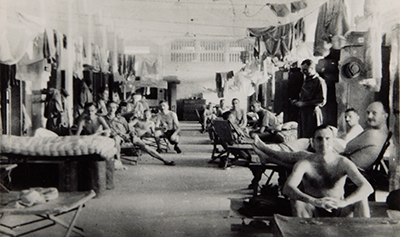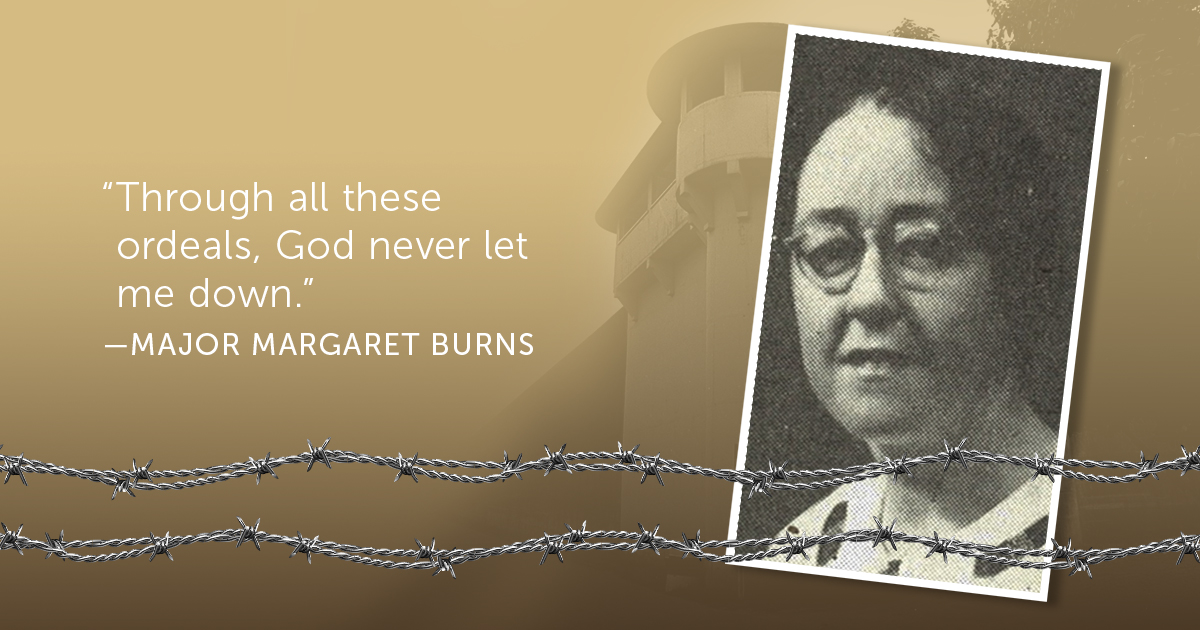Canadian Salvation Army officer Major Margaret Burns was serving as a missionary in Singapore when her life took a dramatic turn on December 8, 1941, the day after the attack on Pearl Harbor. On that day, Japanese forces occupied Singapore. The following are excerpts from Major Burns’ reflections, Japanese Invasion and Internment in Singapore.
Invasion and Internment
All around, the silence could be felt in the air that something was wrong. Four o’clock in the morning, the first bombs were dropped in Singapore. People began running to and fro, not knowing where to go for shelter. Colonel Bertha called to me, “Hurry up, get up, we are in the middle of a war!”
Salvation Army officers were rounded up and sent to a holding compound where food was scarce, malnutrition universal. Then, on March 8, 1942, prisoners were awakened for the arduous journey to their prison camp.
We are made to stand in line and be counted and re-counted. Finally, we set off, six deep and a sentry at the end of each row with fixed bayonets. This march was 10 miles, blazing hot in the eastern sun.
Prison Life
Finally, we arrived at the prison. As I came to the gates, I heard officers and other Christian personnel singing: “Except I am moved with compassion, how dwelleth thy Spirit in me. In word and in deed, burning love is my need: I know I can find this in thee.” A peace came over my soul. The Christians were praying for us. God was indeed there, even though all was confusion.
Now the gates are locked, and freedom is gone. The prison was originally built to hold 600 inmates. We were crowded in, 3,600. The building was filthy. We were assigned to a space of three feet, three to a cell. Many times, I went hungry.
Medical care was rare. People suffered in agony and hopelessness without treatment or medication. Suicide was an all-too-common release.
Exercising Her Faith
In the midst of the intimidation and cruel treatment, prisoners were often punished severely for simply addressing the guards.

One day, while crossing the courtyard, Major Burns called out to a sentry who was not in his regular place. As he returned to his spot, she demonstrated remarkable courage by bowing her head and proceeding across the compound to the hospital. A male Salvation Army officer who witnessed the incident approached Major Burns and asked, “Were you not afraid?”
No, at that moment there was no fear because I had assurance of the presence of the Lord. “In the time of trouble he shall hide me in his pavilion: in the secret of his tabernacle shall he hide me” (Psalm 27:5 KJV). There was my shelter!
Engaging in Ministry
The first Sunday in camp, I gathered the boys and girls and we went into this place called the Rose Garden, which was just by the Japanese offices. I taught them the chorus, “God make my life a little light, within this world to glow! A little light that burneth bright, wherever I may go.” This we sang over and over until they had learnt it by heart.
Halfway through, the camp commandant came to me and said, “You cannot stay here because the Japanese offices are here.” I informed her that we had not prayed yet so we could not finish, and besides, it might do the guards good!
From that courageous and determined stand, not only did the Sunday school continue but church services commenced as well. This continued throughout the duration of the internment.
Life-Altering Injury
One day, I slipped and injured my spine. I lay in great pain but there was no medication to relieve it. After several days, the pain grew worse and it was decided that I should enter the hospital, which was situated in the dungeon of the prison, with only a small window in it, but this was the only place where there were beds.
Over the next few weeks and several excruciating journeys to the doctor, Major Burns was diagnosed with a severe spine injury and fitted with a full body plaster cast from neck to hips, one leg from ankle to thigh, and one arm from wrist to shoulder. Though this cast was to have been checked and removed a few months later, she remained in it and in the prison hospital until her release more than three years later.
Release
Just before the end, things got very bad. Bombing and shelling commenced, casualties occurred. A piece of shell hit the window sill next to my bed. God, in many miraculous ways, preserved my life.
One morning, I saw our men throw down their picks and shovels and then begin to run. We did not know if it was good news or bad. However, it was good news for the internees. The Allies had come to liberate us, and the doctor brought one of the airmen into the ward to prove to us patients that at last we were free.
Postwar Recovery
At a skeletal weight of 75 pounds, Major Burns was told by doctors that she might never walk again, but she did. After months of intensive therapy and convalescence, she was strong enough to go home to Canada and a joyous celebration with her family. Her gruelling recovery eventually permitted her to fulfil her dream to return to her beloved Singapore. Eventually, ill health caused her to retire to Canada.
For her bravery and courage, she received a letter from King George VI in 1945. And at the 1982 Canadian Centennial Congress, she was presented the Certificate of Exceptional Service by General Jarl Wahlström. In the conclusion of her journal in 1979, Major Burns wrote:
Yet through all these ordeals, God never let me down. He protected me and brought me through safely. I look back over life and know that one of the greatest blessings is that the future is in his hands. We know not what the future holds but we know who holds the future. Praise God from who all blessings flow.
Reprinted from The Crest, Fall 2020 and Winter 2021
This story is from:










Leave a Comment